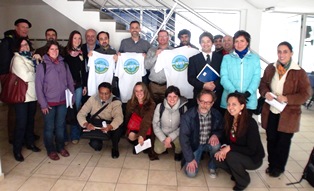
 Energy efficiency experts and representatives from several countries participated in the technical exchange mission, held May 22-23. The event was organized by the ECPA Energy Efficiency Working Group.
Energy efficiency experts and representatives from several countries participated in the technical exchange mission, held May 22-23. The event was organized by the ECPA Energy Efficiency Working Group.
A key goal was to begin a dialogue about how the U.S. Weatherization Assistance Program (WAP) might be used as a model and applied in other countries. Created in 1976 by the U.S. Department of Energy, WAP facilitates energy upgrades in low-income homes. It has produced energy savings, strengthened communities, improved the health and quality of life of millions of families, and helped to mitigate climate change and create green jobs.
Representatives of five countries—Argentina, Chile, Peru, the United States, and Uruguay—discussed the possibility of training new green workers as “weatherizers,” using WAP guidelines as a starting point. The workers would learn how to do energy audits of low-income homes and make cost-effective modifications to improve energy efficiency as well as health and safety.
A pilot project was completed in Rosario, Argentina, in 2013 and has since been expanded to Buenos Aires. Similar efforts are being considered for other areas in the region, particularly in countries prone to extreme weather conditions.
All the participants agreed that for weatherization efforts to be successful outside the United States, they must be adapted to the types of housing in the region, taking into account cultural and lifestyle differences as well as economic resources and the building materials available. The meeting gave participants the chance to identify potential barriers and opportunities for energy efficiency at the residential level and share some of the lessons they have learned.
As host country, Uruguay took the opportunity to showcase the work it has done through its Basket of Services Program, which seeks to improve the quality of life for economically vulnerable Uruguayan families and advance social integration. The program, which facilitates access to an array of basic services, promotes a culture of efficient use of public resources.
The meeting in Montevideo was in keeping with social goals included in the country’s Energy Policy “Uruguay 2030,” which calls for finding energy solutions for disadvantaged homes and areas and promoting energy-efficient habits to ensure steady, secure, and sustainable access to services.
 View Map
View Map